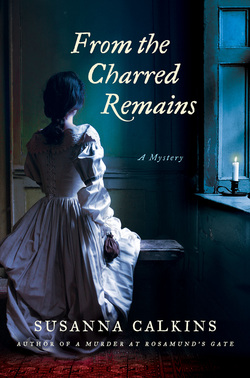 Anyone who knows me, knows I really love doing puzzles. Even when I was a kid, I was always doing puzzles--from word searches to crossword puzzles to substitution ciphers (probably because I felt like I was really decoding mysteries). But when I was in graduate school, I first encountered the fun of acrostics. In the high Middle Ages, scholars like Alcuin of York (Charlemagne's tutor) used to write short poems that contained clever messages--sometimes hidden--when read a certain way. In their simplest form, the first letter of each line would be carefully selected so that, when read down, the reader could discern a message. However, they could be more complex as well, which always fascinated me. I just knew that I had to work acrostics and other puzzles into my story, when I came across this acrostic published just after the Great Fire of London in 1666: London's Fatal Fal, an acrostic. Lo! Now confused Heaps only stand On what did bear the Glory of the Land. No stately places, no Edefices, Do now appear: No, here’s now none of these, Oh Cruel Fates! Can ye be so unkind? Not to leave, scarce a Mansion behind… Working out my own acrostic--and actually several hidden anagrams within the acrostic (shhh!!!)--was probably the most challenging and fun part of writing From the Charred Remains. But puzzles abound throughout the entire novel. There is even a secret hidden on the cover of the book, which you will understand after you read it!
1 Comment
 I've been running into a funny problem while reflecting on the edits for my second Lucy Campion mystery (From the Charred Remains, out in April 2014!). It's the same problem I encountered when talking to a book group tonight... I'm having some trouble keeping the details of my stories straight. Crazy, right? How can I not know my own stories? I spent YEARS writing them (at least A Murder at Rosamund's Gate.) But still, I have notes and charts and timelines and figures (yes, figures!) detailing subplots, tracking character motivations, etc. And yet, I'm still a bit confused sometimes. How is this possible? So I raised the question of my faulty memory with my chief psychological consultant (literally my resident psychologist, a.k.a my alpha reader). "I wrote the darn thing!" I whined, er, lamented. "How can I not remember all these details? I shouldn't have to re-read my notes to know my own story. Do I just have the worst memory in the world?" And, with a lift of his eyebrow and a stroke to his goatee, my cognitive psychologist replied, "Ah, well let me tell you about a little thing we in the field like to call PROACTIVE INTERFERENCE." And here's what he explained: "I'd imagine it's always harder for the writer to remember the details than it is for a reader. For the reader, there is one reality and it is laid out there on the page. The writer, however, has vividly imagined (and discarded) many realities. These early imaginings compete and interfere with the memories for the most recent version of the story. This proactive interference is a hallmark of human memory and, sadly, it is largely unavoidable. Be thankful that you took good notes in the first place!" (See why I keep my alpha reader in my permanent employ? He helps me rationalize my disorderly thinking with a neat psychological construct!)
But this idea of proactive interference, and this notion of multiple imagined (and discarded) realities, really does resonate with me. I've found that even though I take notes as I write, I don't keep track of the scenes, characters events, etc. that get deleted or shuffled around. So I retain this memory of what I wrote, even though it's no longer in the manuscript, which is why I'm sometimes confused months later. I also wrote another unrelated novel in the interim, which probably doesn't help with my recall of the one currently being edited. Perhaps I could do a better job of documenting the changes I make when I write (although, really, it's not like I EVER get rid of a draft!). But, in a way, I sort of like the idea that underlies this confusion. Maybe it's part of the romantic image of writer as creator: the idea that one being can simultaneously hold multiple realities is strangely compelling. Or maybe its just convenient to pull out the "proactive interference" defense. Dazzle my questioners with the multiple realities angle, and I can sidestep the missing details altogether. But what do you think? Will that fly? 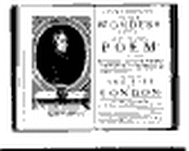 the codes in the fire poems... There's been sort of a funny game of tag going among writers recently, called "The Next Big Thing." So crime fiction writer Holly West was kind enough to tag me, which means it's my turn to answer some writerly questions and tag some other writers. 1) What is the working title of your next book? After A Murder at Rosamund's Gate releases April 23, 2013 (sigh, yes, I'm still awaiting this great moment), my next book featuring Lucy Campion is From the Charred Remains. That's still my working title at the moment, although I will probably change it when the book gets closer to publication (in 2014). 2) Where did the idea come from? FTCR continues two weeks after A Murder at Rosamund's Gate leaves off; that is, directly after the Great Fire of London in 1666. So many people, including Lucy, were pressed into service to assist in the great clean-up after the Fire. I thought for sure secrets would have to emerge from charred remains. Of course, plucky Lucy has to be the one to encounter an intriguing puzzle.... 3) What genre does your book fall under? FTCR is a mystery, and within that historical fiction and traditional. I'm not quite sure if readers at Danna's awesome cozy mystery blog would call it a cozy or not, but like Anne Perry's books, it has elements of a cozy.  4) What actors would you choose to play the part of your characters in a movie rendition? I don't want to give away my thinking completely (since I prefer readers to imagine characters for themselves) but I wouldn't be adverse to the compelling Michael Kitchen (Foyle's War) portraying my kindly magistrate. 5) What is the one-sentence synopsis of your book? Ack! The dreaded one-sentence synopsis. Torture to the writer! Here goes... Lucy Campion, a chambermaid turned printer's apprentice, discovers in the aftermath of the Great Fire the body of a murdered man; on his corpse, she finds a poem which she publishes, little realizing that this act would bring her once again into direct confrontation with a murderer. 6) Will your book be self-published or represented by an agency? I am represented by the amazing David Hale Smith of Inkwell Management. Both books will be released by Minotaur Books (St. Martin's Press). 7) How long did it take you to write the first draft? Given that A Murder at Rosamund's Gate took me about ten years to write (seriously!) I'm amazed to say that I wrote FTCR in just a few months. 8. What other books would you compare this story to within your genre? I've been inspired by both Anne Perry and Rhys Bowen. 9) Who or what inspired you to write this book? I've been inspired to write these stories ever since I was a doctoral student of history. My husband and kids inspire me every day to keep pursuing my dream... 10) What else about the book might pique the reader's interest? If you like puzzles and codes, this one is for you... On Dec. 19, please be sure to check out these awesome writer's blogs...
Anna Lee Huber, The Anatomist's Wife Helen Smith, Alison Wonderland 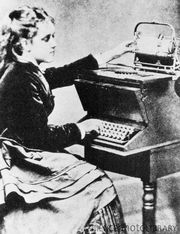 The biggest secret I ever kept from my husband was that I was writing a novel. We've been together close to 15 years and I'm sure from time to time I'd murmur something about 'having done some writing today' but I never talked much about the content. I guess at some point he knew I was working on a mystery of sorts, and maybe that it was set in seventeenth-century England, but really, that was about it, until a few years ago when I began to write in earnest. I didn't set out to keep my novel-writing a secret. The truth is, I wasn't writing every day (I do have two young children and well, a whole other career), but I also didn't view myself as a writer, let alone as an author. Sure, I "author" academic publications, but to call myself a "writer" felt somehow pretentious, even precious. I also felt that if I talked about my story, I would somehow lose it, that it would slip into the ether. And I still feel that way! (Case in point: my husband has now read the second book in the series, From the Charred Remains--the only person who's done so-- but he's yet to read the entire other novel I wrote while A Murder at Rosamund's Gate was out on submission to agents). So when I was writing Rosamund's Gate, I never really knew any other writers...or so I thought. I wasn't taking writing classes; I'd never participated in a critique group; and I hadn't yet encountered the vibrant online writing community that I now know about. So I've been pleased and surprised to discover, when I finally started telling people that I had written a book, how many other people were thinking about--or were actively engaged in--writing novels too. Childhood friends, neighbors, family members, colleagues, parents of my kids' friends, random acquaintances at the coffee shop--sometimes I wonder who's NOT writing a book. So what's YOUR book about? And I'm just so curious--what stage are you at? Brainstorming, dreaming, plotting, most of a draft done...or even further? I'd love to know! 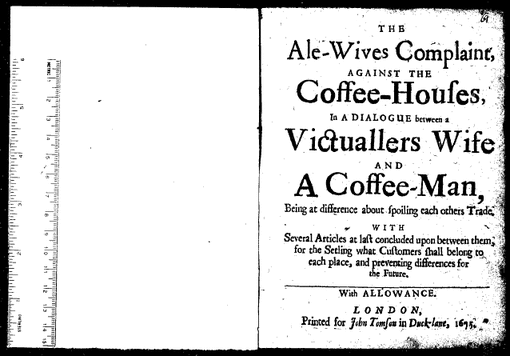 (1675) Wing / 1298:09 O Oh Ale-Wife! Oh, Coffee-Man! Can't we all get along? I promise, I'll divide my time among your fine establishments!
I'll be taking a short break from writing my blog for a while, well, to get some writing done. I'm about halfway finished my copy edits for A Murder at Rosamund's Gate. I'll also be working on the second draft of From the Charred Remains soon, gnashing my teeth over the feedback from my alpha reader. In the mean time, I'll leave you to contemplate how the ale-wife and coffee-man, long embroiled in cantankerous railing (stealing each others' customers!), came to enter a "friendly consultation." The ale-wife promised that "any person being reelingly drunk may be entertained in a coffee-house to make himself sober..." (Essentially, she promised to get her customers as drunk as possible and send them over to the Coffee-House, to improve the coffee man's coffee sales.) Similarly, the Coffee-Man agreed to send any of his customers who were tired of "superior speech" and "prittle prattle" over to the Ale-House. This way, they could get on with the business of "honest drinking." See, everyone wins! All this to say, if you need me, I'll be at the coffee house. Or at a tavern. Or on a seventeenth-century walkabout. (Okay, maybe grading papers. Maybe doing my day job.) Certainly writing. But I won't be on my blog. At least, not for a few weeks. Cheers!  Quick! What do these celebrities--Will Smith, Elizabeth Taylor, Tina Turner, Monica Potter, and Bradley Cooper--all have in common? Hint: It's something medieval.... Each bears the last name of a medieval/early modern occupation. (Smith and taylor/tailor are self-explanatory, but a turner operated a lathe, a cooper made barrels, and a potter, well, potted). I was thinking about this--how many early modern guilds are still represented in surnames today--as I was doing research for my second novel, From the Charred Remains (2013). I had come across the occupation of “cordwainer.” Cordwainer? I knew this was an occupation, like a tinker, or a wainwright (wheelmaker) or a hooper (another name for barrel-maker), but I have to admit, I never thought to look this one up. 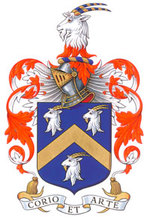 The cordwainer crest Any guesses?..... No? Well, it turns out a “cordwainer” is a shoemaker. The term originated in medieval Cordoba in Spain, a region controlled by Muslims who excelled, among other things, in the production of high-quality specially-tanned leather. (See the goats in the guild crest?) 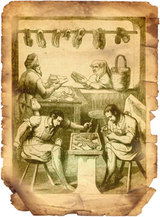 cordwainers at work The French referred to those who made shoes from this leather as cordonnier, which became “cordwainer” in England (you know, after that little Norman invasion of England in 1066). According to the website for the Worshipful Company of Cordwainers--yes, the medieval guild still exists today as a charitable group!—the cordwainer must be distinguished from the cobbler. The cordwainer only worked with new leather, while the cobbler could only work with old. (Indeed, cobblers could get in a lot of trouble if they were found with new leather). 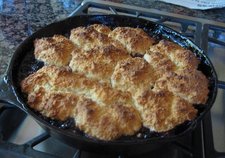 mmm...leatherless cobbler pie And the more important question of all? What does any of this have to do with blueberry cobbler? (Only that early American settlers used to make pie from any foodstuffs on hand-- cobbling it together as a cobbler would piece together shoes...Maybe Will Smith likes blueberry cobbler too, I don't know.) What do you think? Do you know of any surnames--celebrity or otherwise--that have an interesting history? |
Susanna CalkinsHistorian. Mystery writer. Researcher. Teacher. Occasional blogger. Categories
All
Archives
May 2023
|
 RSS Feed
RSS Feed